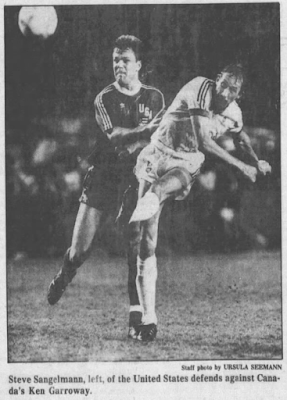On This Day in 1986, a Goalless Draw with Canada Led to Another Draw After Missing the World Cup
The inaugural Miami Cup, part of the 1986 Miami Winter Games, marked a fresh start for the United States national team. The six-team tournament attracted three World Cup-bound sides: Uruguay, who had previously won soccer's biggest prize; Paraguay, who qualified through a playoff victory over Chile; and Canada, who earned their first-ever World Cup berth. Colombia and Jamaica rounded out the field. Brazilian legend Pele kicked off the festivities, arriving in a white stretch limousine wearing a black satin jacket to promote the tournament. "It doesn't matter who wins," Pele said. "What's important is that the teams put on a nice show for the people and score some goals."
For new U.S. coach Lothar Osiander, the tournament represented his first challenge after being hired just days before to revamp a floundering program. The German-born Osiander, who still worked as a waiter at Graziano's in San Francisco because he couldn't afford not to, completely overhauled the squad. Gone were NASL veterans like goalkeeper Arnie Mausser, replaced by college players with an average age of 21. For this tournament, though, the USA and Canada teams were without their MISL (Major Indoor Soccer League) players, who were not released, and the American squad comprised college players.
"We're fighting the high schools, the colleges, the Major Indoor Soccer League and the semipro outdoor leagues — to get players and mostly to keep them," Osiander explained of the challenges facing U.S. Soccer.
On February 5, the young Americans showed their potential in a scoreless draw with World Cup-bound Canada before an announced crowd of 5,182 at the Orange Bowl. Despite having only four days of practice together, the U.S. grew stronger as the match progressed. Clemson midfielder Eric Eichmann, who used to train with the Fort Lauderdale Strikers, impressed in his international debut patrolling the middle of the field.
"There are some guys in this room whose names I didn't know four days ago," Eichmann said after the match. "When the final whistle blew, I felt something was about to happen. We had started to create some chances."
Former Strikers legend Teofilo Cubillas waited outside the U.S. locker room to congratulate his protégé Eichmann. "Eric is a nice guy," Cubillas said. "He is a good player and can get even better. He only needs more competition at this level."Two days later, the Americans followed up the Canada result with another impressive showing, drawing Uruguay 1-1. Bruce Murray gave the U.S. an early lead in the eighth minute, and they held that advantage until Carlos Aguilera equalized in the 75th minute. The goal sent Uruguay's fans into celebration, causing the majority American crowd to respond with chants of "USA!" Though Uruguay advanced to the final on goal difference, Osiander's makeshift squad proved they could compete with established soccer nations.
"You can't build a team in three days; it takes three years," Eichmann reflected. "I cross my fingers that we can keep this team together because we proved we can play with the best. The talent is here."
Uruguay's coach, Omar Borras, agreed, "They have a good future, this American team."
The tournament marked an encouraging start to Osiander's rebuilding project, which aimed at the 1988 Olympics and 1990 World Cup. However, he remained realistic about the long road ahead: "I would not want to play Germany or Brazil right now, but for a start, you can call this a good week for us."
After the tournament, the players scattered back to their colleges, and Osiander returned to waiting tables. Due to the federation's limited budget, the U.S. wouldn't play again for months. "Thirty years ago, I came to the United States from West Germany. I was young, and everybody said, 'In 10 years, we will be a world power,'" Osiander said. "Now I'm old, and they still say, 'In 10 years, we will be a world power.' But we are not even close. By 1994, if the youth players continue to grow and we can have enough money to properly run a national team, maybe by then we can talk about it."




No comments:
Post a Comment